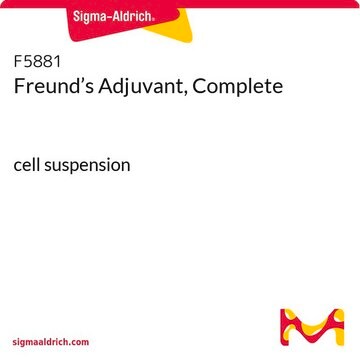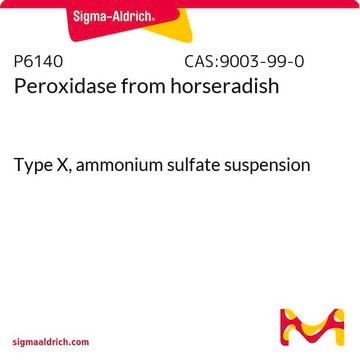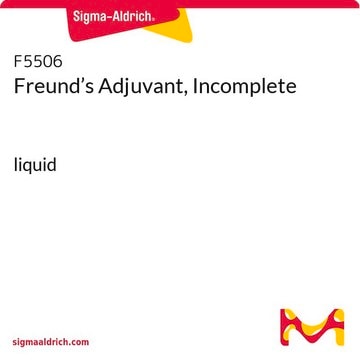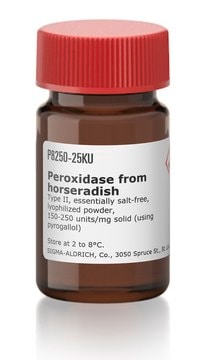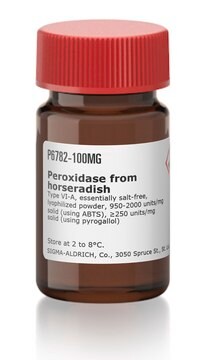P6278
Peroxidase Inactivated
≤0.02 units/mg protein (biuret)
Sinónimos:
Peroxidase, inactivated from horseradish peroxidase
Iniciar sesiónpara Ver la Fijación de precios por contrato y de la organización
About This Item
Productos recomendados
form
powder
Quality Level
200
300
specific activity
≤0.02 units/mg protein (biuret)
impurities
salt, free
solubility
0.85% sodium chloride: soluble 15 mg/mL, clear to slightly hazy, colorless to light yellow
storage temp.
2-8°C
Categorías relacionadas
Application
Inactivated peroxidase is used to study regeneration of inactivated peroxidase enzymes. It has been used to study the mechanism of peroxidase solubilization and it is used to study antitumor activity of immobilized peroxidase systems. It may be used for developing differential staining techniques in nerve tissue preparations.
Biochem/physiol Actions
HRP readily combines with hydrogen peroxide (H2O2) and the resultant [HRP-H2O2] complex can oxidize a wide variety of hydrogen donors. The optimal pH is 6.0-6.5 and the enzyme is most stable in the pH range of 5.0-9.0. HRP can be conjugated to antibodies by several different methods that include the use of glutaraldehyde, periodate oxidation, disulfide bonds, and also via amino- and thiol-directed cross-linkers. It is smaller and more stable than the enzyme labels, β-galactosidase and alkaline phosphatase. Hence, it is the most desired label. Also, its glycosylation leads to lower non-specific binding. It is also used for the determination of glucose and peroxides in solution. Sodium azide, cyanide, L-cystine, dichromate, ethylenethiourea, hydroxylamine, sulfide, vanadate, p-aminobenzoic acid, and ions such as Cd2+, Co2+, Cu2+, Fe3+, Mn2+, Ni2+, and Pb2+ are found to inhibit the enzyme activity.
Inactivated peroxidase reacts with goat and rabbit anti-peroxidase. It may be reactivated various methods such as heating.
Unit Definition
One unit will form 1.0 mg purpurogallin from pyrogallol in 20 sec at pH 6.0 at 20°C.
Preparation Note
Prepared from Type VI horseradish peroxidase by a modification of the method of Teale.
Storage Class
11 - Combustible Solids
wgk_germany
WGK 3
flash_point_f
Not applicable
flash_point_c
Not applicable
ppe
Eyeshields, Gloves, type N95 (US)
Elija entre una de las versiones más recientes:
¿Ya tiene este producto?
Encuentre la documentación para los productos que ha comprado recientemente en la Biblioteca de documentos.
L L Vacca et al.
The journal of histochemistry and cytochemistry : official journal of the Histochemistry Society, 23(3), 208-215 (1975-03-01)
Immunoperoxidase techniques are presented which can be used to localize horseradish peroxidase-tracer in paraffin-embedded tissues of the central nervous system. Compared to histochemical methods using frozen sections, these immunologic techniques allow the use of stored, serial paraffin sections, and appear
S Morimoto et al.
The Journal of biological chemistry, 274(37), 26192-26198 (1999-09-03)
Elicitor treatment or mechanical damage to Scutellaria baicalensis Georgi (skullcap plants) callus causes an immediate insolubilization of a 36-kDa protein into cell walls. The 36-kDa protein was identified as peroxidase 1 by analysis of its internal amino acid sequence and
Dual projections of single neurons are visualized simultaneously: use of enzymatically inactive [3H]HRP.
N L Hayes et al.
Brain research, 165(2), 321-326 (1979-04-13)
C J Forehand et al.
The Journal of neuroscience : the official journal of the Society for Neuroscience, 2(5), 654-652 (1982-05-01)
This study of spinal cord injury in bullfrog (Rana catesbeiana) tadpoles using the neuroanatomical tracer horseradish peroxidase (HRP) was undertaken to determine (1) whether the same anatomical regions that normally give rise to ascending or descending spinal tracts do so
Cleavage of the haem-protein link by acid methylethylketone.
F W TEALE
Biochimica et biophysica acta, 35, 543-543 (1959-10-01)
Nuestro equipo de científicos tiene experiencia en todas las áreas de investigación: Ciencias de la vida, Ciencia de los materiales, Síntesis química, Cromatografía, Analítica y muchas otras.
Póngase en contacto con el Servicio técnico
